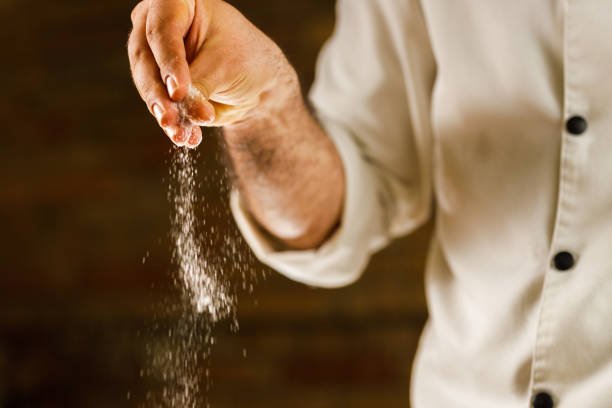- Salt is a common part of our daily diet. It’s found in almost everything we eat—from homemade meals to restaurant food, and especially in packaged snacks and fast food. While our bodies do need a small amount of salt to function properly, eating too much salt can quietly harm our health in ways we may not even realize. Over time, it can increase the risk of several serious health issues that can lower the quality of life and even shorten it.
In this blog, we will explore six important health risks linked to eating too much salt, how it affects the body, and what you can do to reduce your salt intake without sacrificing flavor.
1. High Blood Pressure: The Silent Killer

One of the most well-known dangers of consuming too much salt is high blood pressure, also called hypertension. Salt causes the body to hold onto water. This extra water raises the volume of blood in your blood vessels, which leads to increased pressure on the walls of the arteries.
High blood pressure often comes with no symptoms, earning it the nickname “the silent killer.” Many people don’t know they have it until it causes major health problems like heart attacks or strokes. Reducing salt in your diet can help lower your blood pressure and protect your heart.
2. Heart Disease: Putting Your Heart at Risk

Eating too much salt doesn’t just raise blood pressure—it also increases the risk of heart disease. When blood pressure stays high for a long time, it makes the heart work harder than it should. This extra strain can cause the heart muscles to thicken and the arteries to become stiff or narrow. These changes raise the risk of heart attacks, heart failure, and other heart-related conditions.
Studies show that people who regularly consume high amounts of salt are more likely to have heart problems than those who eat moderate or low levels of salt. Simply cutting back on salty foods can help reduce this risk significantly.
3. Kidney Damage: Silent Strain on a Vital Organ

Your kidneys are responsible for filtering waste and extra fluids from your blood. But when you eat too much salt, it puts extra pressure on the kidneys to remove the excess sodium from your body. Over time, this can lead to reduced kidney function or even chronic kidney disease.
High salt intake has also been linked to the development of kidney stones, which are painful and can lead to infections or other complications. Drinking plenty of water and reducing your salt intake can help protect your kidneys and keep them functioning properly.
4. Osteoporosis: Weakening Your Bones

Many people are surprised to learn that too much salt can affect bone health. Here’s how it works: salt increases the amount of calcium lost through urine. Since calcium is essential for strong bones, losing too much of it can lead to a condition called osteoporosis, where bones become weak and more likely to break.
This is especially concerning for older adults and postmenopausal women, who are already at higher risk for bone loss. Making small changes, like choosing low-sodium foods and eating more calcium-rich meals, can help strengthen bones and lower the risk of fractures.
5. Stomach Cancer: A Hidden Threat

Recent research has suggested a strong link between too much salt and stomach cancer. Salty foods, especially preserved or processed ones like cured meats, pickles, and instant noodles, can damage the lining of the stomach. Over time, this damage may increase the risk of developing cancer in the stomach.
Salt may also help harmful bacteria like Helicobacter pylori survive in the stomach, which can further raise cancer risk. Eating more fresh fruits and vegetables and fewer highly processed salty foods can protect your stomach and support long-term health.
6. Bloating and Water Retention: The Uncomfortable Side Effect

If you’ve ever felt puffy or swollen after eating a salty meal, you’re not alone. Too much salt causes the body to hold onto extra water, which leads to bloating and puffiness. This water retention can make you feel sluggish, uncomfortable, and heavier than you actually are.
Although bloating is not as serious as some of the other health risks, it can still affect your daily comfort and confidence. Reducing your salt intake can help your body maintain a better fluid balance and keep bloating to a minimum.
Why Are We Eating So Much Salt?
One major reason people eat too much salt is because it’s hidden in many everyday foods. Items like bread, canned soups, sauces, and even breakfast cereals can contain high amounts of sodium. Fast food and take-out meals are also packed with salt to enhance flavor and preserve shelf life.
Many people don’t even realize how much salt they are consuming each day. The recommended daily limit for most adults is about 2,300 milligrams of sodium, which is roughly one teaspoon of salt. However, most people eat far more than that without knowing it.
Tips to Cut Down on Salt Without Losing Flavor
Reducing salt in your diet doesn’t mean your meals have to be bland or boring. Here are a few simple tips that can help:
-
Use herbs and spices: Season your food with garlic, pepper, lemon juice, ginger, or fresh herbs like basil and thyme instead of reaching for the salt shaker.
-
Choose fresh foods: Cook more meals at home using fresh fruits, vegetables, and lean meats. Avoid processed and pre-packaged items when possible.
-
Read labels: Check nutrition labels for sodium content and choose products labeled “low sodium” or “no added salt.”
-
Rinse canned goods: If you use canned vegetables or beans, rinse them under water to remove some of the sodium.
-
Eat mindfully: Pay attention to how your body feels. Over time, your taste buds will adjust, and you’ll start to enjoy the natural flavors of food.
Small Changes Make a Big Difference
Eating too much salt can lead to serious health problems that build up quietly over time. From high blood pressure and heart disease to kidney damage and bone loss, the risks are real—but they are also preventable. By understanding where salt hides in your diet and making small, steady changes, you can take control of your health and feel better every day.
Remember, your body needs only a small amount of salt to stay healthy. So the next time you reach for that extra pinch, think twice. Your heart, kidneys, bones—and even your stomach—will thank you.
Stay connected with us for more such lifestyle related topics! Read the latest national and international news on Khabari Bandhu – Business, Education, Entertainment, Religion, Cricket, Horoscope and much more.
Top 10 Mental Health Books to Read on a Solo Trip – A Journey for Mind, Heart & Self
Chromotherapy Explained: Can Color Light Really Help Depression?

